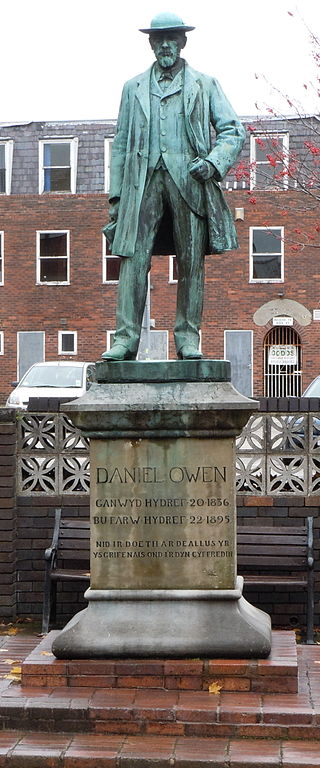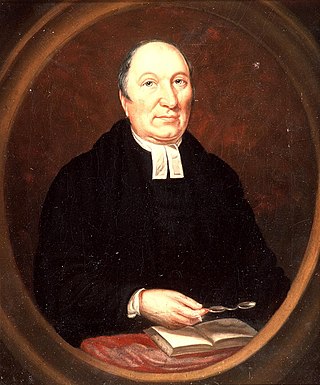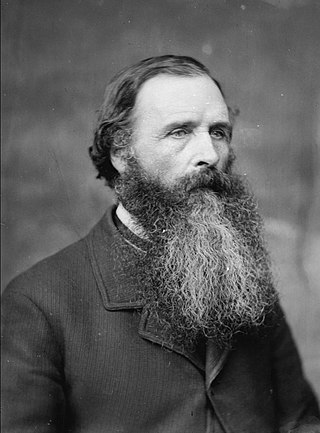
William Williams, Pantycelyn, also known as William Williams, Williams Pantycelyn, and Pantycelyn, was generally seen as Wales's premier hymnist. He is also rated among the great literary figures of Wales, as a writer of poetry and prose. In religion he was among the leaders of the 18th-century Welsh Methodist revival, along with the evangelists Howell Harris and Daniel Rowland.

Rhys Owain Evans, better known as Rhys Ifans, is a Welsh actor. He is best known for his roles in Notting Hill (1999), Kevin & Perry Go Large (2000), and Enduring Love (2004) as well as his portrayals of Xenophilius Lovegood in Harry Potter and the Deathly Hallows – Part 1 (2010), Dr. Curt Connors/Lizard in The Amazing Spider-Man (2012) and the Marvel Cinematic Universe film Spider-Man: No Way Home (2021), and Grigori Rasputin in The King's Man (2021). Other roles include Hector DeJean in the Epix thriller series Berlin Station, Mycroft Holmes in the CBS series Elementary, and Ser Otto Hightower in the HBO fantasy series House of the Dragon.
The Presbyterian Church of Wales, also known as the Calvinistic Methodist Church, is a denomination of Protestant Christianity based in Wales.

Daniel Owen was a Welsh novelist. He is generally regarded as the foremost Welsh-language novelist of the 19th century and the first significant novelist to write in Welsh.

Thomas Charles was a Welsh Calvinistic Methodist clergyman of considerable importance in the history of modern Wales.

Ann Griffiths was a Welsh poet and writer of Methodist Christian hymns in the Welsh language. Her poetry reflects her fervent Christian faith and thorough scriptural knowledge.
The 1904–1905 Welsh revival was the largest Christian revival in Wales during the 20th century. It was one of the most dramatic in terms of its effect on the population, and triggered revivals in several other countries. The movement kept the churches of Wales filled for many years to come, seats being placed in the aisles in Mount Pleasant Baptist Church in Swansea for twenty years or so, for example. Meanwhile, the Awakening swept the rest of Britain, Scandinavia, parts of Europe, North America, the mission fields of India and the Orient, Africa and Latin America. The Welsh revival has been traced as the root of the megachurches in the present era.

Christmas Evans was a Welsh nonconformist minister, who, according to D. M. Lloyd-Jones, was "the greatest preacher that the Baptists have ever had in Great Britain."

James Sauvage, was a Welsh baritone singer.

How Green Was My Valley is a 1941 American drama film directed by John Ford, adapted by Philip Dunne from the 1939 novel of the same title by Richard Llewellyn. It stars Walter Pidgeon, Maureen O'Hara, Anna Lee, Donald Crisp, and a young Roddy McDowall.

William Thomas, bardic name Islwyn, was a Welsh language poet and Christian clergyman. His best known poems were both called Yr Ystorm ['The Storm'], and were written in response to the sudden death of his fiancée.
Thomas Jones, called "Thomas Jones of Denbigh" to differentiate him from namesakes, was a Welsh Methodist clergyman, writer, editor and poet, active in North Wales.
Y Drysorfa was a Calvinistic Methodist publication produced in Wales and written in the Welsh language. Although published intermittently before 1830, it became a regular publication in 1831, when preacher John Parry became its editor.

Roger Edwards D.D. was a Welsh Calvinistic Methodist, who later became prominent in Wales as a press editor and publisher.
Morgan Rhys was a Welsh hymn-writer.
James Eirian Davies was a Welsh poet and Methodist minister. His wife, Jennie, was a well-known journalist and politician.

John Davies was a Welsh Calvinistic Methodist minister, preacher and writer.

Bethany was a Calvinistic Methodist/ Presbyterian Church of Wales chapel in Ammanford, Carmarthenshire, Wales, from 1881 to 2023.

Richard Owens was a Welsh architect, working mostly on urban housing in Liverpool, England and on the construction of chapels in Wales.

Joseph Jenkins was a Calvinistic Methodist preacher, known as a progenitor of the 1904-1905 Welsh revival, a Christian revival in which, the BBC says, "a hundred thousand people had made a new commitment." A strong personality, Jenkins affected many church communities as a preacher, his contemporaries saying he resembled a volcano — "sometimes lifeless and sometimes in full eruption."













